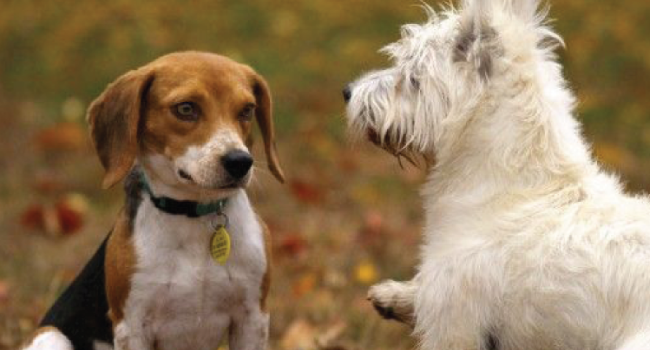Rescuing or adopting a dog is one of the most kind-hearted things you can do, but it doesn’t come without its trials. You don’t know what that dog has been through. Abuse or neglect? You are bringing an animal into your home that has already had another owner, whether good or bad. Obviously Rocky and Snow are perfect in every way, goober smile, wide eyes, and large personality. You might be one of the lucky ones and end up with a perfectly house-trained and well-behaved pupper, but that isn’t the case for everyone. Dogs will often react in new situations, especially if there are already other dogs in the household, or just on daily walks. There are two ends of the spectrum: aggression and avoidance. Here are a few quick tips for socializing your new family member and giving them the best chance they have at a happy, adjusted life. Signs of Discomfort If you are having trouble reading your dog’s behavior, these are a few obvious signs of anxiety and aggression.
● Panting
● Barking
● Pacing
● Cowering
● Tail between legs
● Yawning
● Growling
● Teeth Baring
● Biting
Tips and Tricks
Be Positive Consistently-
Positive reinforcement is essential when teaching anyone to learn, and the same goes for dogs, especially rescues. They need all of the love and support they can get as they are coming into a new, unfamiliar environment. Treats, positive commands, and lots of attention are great ways to encourage your dog. When interacting with multiple dogs, make sure you are consistently positive and happy. Your behavior will reflect on theirs. Whenever you see positive interactions between your pups, bring in all of the rewards! The trick is to catch those good moments and be ready with treats. Just make sure to present the reward right after the interaction, not during. It might cause unnecessary quarreling over food.
Soothe Your Dog-
When bringing an unstable dog into your home, remember to keep calm. Always, always, always. Put forth your best soothing voice and calm your dog during fearful situations or stressful encounters. It is important not to raise your voice as that could become more of a trigger for your already stressed dog. Yelling will only give Rocky bad memories for these situations, and he will remember that for the next time. You don’t want to create a pattern of negativity. Even when Rocky interacts badly with your other dogs, don’t overreact. Instead, be calm and create space between the dogs.
Start with Small Experiences-
With a rescue, you can’t just jump into everything off the bat. New dogs take time to adjust. Start small with each new experience in and out of the home. As you work with your rescue and your previous dogs, make a point to keep interactions short and sweet. Small periods of interaction work well because it doesn’t allow time for bad behavior. Repeat these small, positive interactions and you will eventually be able to progress as their interactions continue in a good manner. Protip: If you have more than one previous dog, keep interactions separate between all dogs for a good amount of time. You don’t want the other two dogs to gang up on the new one. This way, they are all separate interactions. As you have more successes, you can start bringing them together.
Even when starting small, it is important to expose your dog to a good amount of new things and experiences. This way, they will be prepared for all situations. Short walks around the block, time in the backyard, playing with friends and family, etc. Make sure to be patient and to assess your dog’s behavior and progress at all times.
Put on Music-
You know how music is great for babies? Yes, it’s a wonderful tool for dogs as well. It can be a calming factor in a dog’s life. While you are gone, the calming noise of music will create a filler for absent noise. Classical music can be a great start and is synonymous with relaxation.
According to Reader’s Digest, researchers found that dogs relaxed when introduced to reggae music and soft rock. Either way, try soothing music for your rescue.
Get Professional Help-
If you are still having trouble with your rescue, it is best to call in a professional. The most experienced trainer will be able to help your dog adjust to new environments and employ good techniques for future behavior. There is always help available. Don’t worry. You will get your beloved pup back on track in no time!


